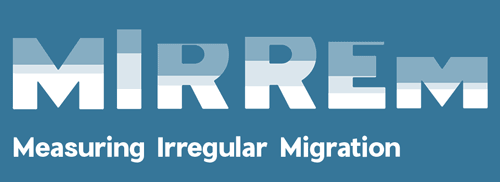Measuring irregular migration and related policies (MirreM)
Targeted policy responses for irregular migration require better knowledge about the characteristics of the irregular migrant population and dynamics of irregular migration, as well as about the effects of policy measures. Yet, quantitative data relating to irregular migration are scarce, often outdated and contested. The inadequecy of current data makes it challenging for stakeholders to develop and monitor policies. How do legal frameworks in different countries define migrant irregularity? What are the characteristics of irregular migrants in terms of age, gender, nationality or other socioeconomic variables? How can the effects of policy measures, such as regularisation, be assessed? MIrreM adresses the challenge of insufficent knowledge about irregular migration and regularisation in Europe by actively involving relevant stakeholders in every stage of this project – as co-creators of its results and as stakeholders to its mission. In a rigorous comparative and multi-level study, we will assess the policies, data needs and estimates that define migrant irregularity in 11 EU member states, the UK, Canada, the USA and five transit countries. Using several coordinated pilots we will develop new and innovative methods for measuring irregular migration and ‘regularisation scenarios’ , we explore if and how these instruments can be transferred or scaled up to other socio-economi or institutional conditions. Based on these insights, we will develop two public databases with estimates on irregular migration stocks and irregular migration flows, including regularisation, respectively. Together with the expert groups, we will synthesize our findings into a Handbook on data on irregular migration and a Handbook on regularisation that will support evidenced-based and targeted policymaking concerning irregular migration. Finally, we will develop training resources for policymakers, practitioners, journalists and early-career researchers.

Czas trwania
2022 - 2025
Źródło finansowania
Horizon Europe
Partnerzy
1 Universitat Fur Weiterbildung Krems (Austria) – Lider
2 European University Institute (Włochy)
3 Universitaet Osnabrueck (Niemcy)
4 Universiteit Maastricht (Holandia)
5 Turun Yliopisto (Finlandia)
6 Universidad Complutense De Madrid (Hispzania)
7 Elliniko Idryma Evropaikis Kai Exoterikis Politikis (Hellenic Foundation For European And Foreign Policy) (Grecja)
8 University Of Leicester (Wielka Brytania)
9 The Chancellor, Masters And Scholars Of The University Of Oxford (Wielka Brytania)
10 Universita Degli Studi Di Milano (Włochy)
11 Universitaet Potsdam (Niemcy)
12 Platform For International Cooperation On Undocumented Migrants Asbl (Belgia)
13 International Centre For Migration Policy Development (Austria)
14 Fondation Migration Policy Institute Europe (Belgia)
15 Uniwersytet Warszawski (Polska)
16 Vrije Universiteit Brussel (Belgia)
17 Ryerson University (Kanada)




